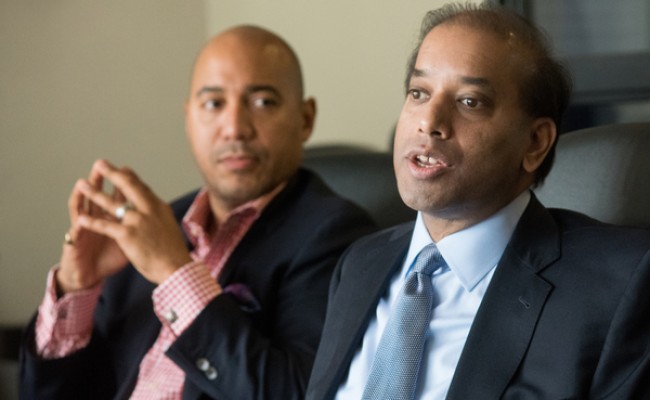As Michigan wrestles with the skills gap, city redevelopment and other do-or-die issues, the 2016 Mackinac Policy Conference has created an agenda with a focus on issues including urban education, entrepreneurism and Michigan’s future in terms of business development and growth.
 Sandy Baruah, CEO and president of the Detroit Regional Chamber recently described the June 1-3 event as a “labor of love” for the Chamber, its sponsors and staff. Although the event is targeted at business leaders as a management retreat of sorts, it will tackle Michigan’s most serious issues, including the Flint water crisis and Detroit schools.
Sandy Baruah, CEO and president of the Detroit Regional Chamber recently described the June 1-3 event as a “labor of love” for the Chamber, its sponsors and staff. Although the event is targeted at business leaders as a management retreat of sorts, it will tackle Michigan’s most serious issues, including the Flint water crisis and Detroit schools.
In its most recent announcement, the Detroit Regional Chamber said Monday that Dan Gilbert, founder and chairman of Quicken Loans and Rock Ventures, will take Michigan’s Center Stage. Gilbert will appear on Wednesday afternoon to discuss Detroit’s progress and what the future holds for the city during a one-on-one conversation with Dennis Archer Jr., president of Archer Corporate Services and 2016 Mackinac Policy Conference Chair.
In addition to the much-anticipated conversation with Gilbert, this year’s speakers range from “Mackinac Moments” with Dr. Mona Hanna-Attisha, the doctor who bought national attention to the Flint water crisis, to keynotes with General Motors Corp. President Dan Ammann to panels on education including Detroit Public Schools.
The Mackinac Policy Conference, which runs June 1-3, will take place on Mackinac Island in northern Michigan. The annual event will feature top-level speakers, panel discussions with thought leaders and other programming with nearly 1,500 statewide business, government and community leaders on-site.
New this year will be a “Slow Roll,” or bicycle ride hosted by Detroit entrepreneur Jason Hall around the Island as well as a special “Shark Tank” style competition with keynote speaker Daymond John, Baruah and Archer.

Archer, who said he has been attending Mackinac conferences since he was a child with his parents, noted that Michigan has a strong foundation of growing industries and successes. While most of the focus will be on what the state is doing well, the conference also will tackle areas that need attention. These include infrastructure in cities including Flint and education across the state.
“Michigan will be center stage,” Baruah said of the event, which will be available online, through Detroit Public Television and live streamed on the Internet. “We have a lot to be proud of in this state: Our low unemployment rate, our reputation and how successful our businesses are.”
Having strong media voices as a part of the conference – political columnist Ron Fournier and journalist Soledad O’Brien in particular – also will advance the conversation beyond blame and debate and into finding solutions to these long-term issues, Archer and Baruah said.
Education also will be a hot topic because Michigan need skilled workers and post-secondary training to maintain talent within the state. The conference will talk about nationwide models that are working to help highlight what could be done in Michigan, Archer added.
Investment in new businesses, inclusion and the development of smart or connected objects, particularly automobiles, also will serve as major topics of discussion.


